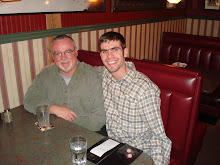Likewise, Spring's brief survey of late 18th-early 19th century Anglo-Saxon America provided me with a rich and stable foundation with which to begin making connections between both texts. I was immediately drawn to the horrendous conditions of the Native American people as the early Europeans began to invade America (not as individuals escaping persecution overseas, but folks whose main objective was to command and conquer anything that frustrated their financial & political plans). It is unfortunate that is taken this long for me to be exposed to some of the truths of our nation's dark history.
some quotes to ponder (hmmm....):
(On the Irish)
“Viewing blacks as 'a soulless race,' some Irish said they 'would shoot a black man with as little regard to moral consequences as they would a wild hog' ” (Takaki, 151).
“...they had been warned by John Quincy Adams: ' [the Irish] come to...a life of labor—and, if they cannot accommodate themselves to the character, moral, political, and physical, of this country...the Atlantic is always open to them to return to the land of their fathers...They must cast off their European skin, never to resume it. They must look forward to their posterity rather than backward to their ancestors; they must be sure that whatever their own feelings may be, those of their children will cling to the prejudices of this country” (Takaki, 163-4).
(On Native Americans)
"The utmost good faith shall always be observed towards the Indians, their lands and property shall never be taken from them without their consent; and in their property, rights and liberty, they never shall be invaded or disturbed" (Spring, 15).
(On Jews)
"The Jews 'reaped more and more dislike as they bettered themselves.' The more avidly they reached out for acceptance and participation in American life, the more their reputation seemed to suffer" (Takaki, 308).
"I work, and I work, without rhyme, without reason--produce, and produce, and produce without end. For what? and for whom? I don't know, I don't wonder--since when can a whirling machine comprehend? No feelings, no thoughts, no the least understanding; this bitter, this murderous drudgery drains the noblest, the finest, the best and richest, the deepest, the highest that living contains. Away rush the seconds, the minutes and hours; each day and each night like a wind-driven sail; I drive the machine, as though eager to catch them, I drive without reason--no hope, no avail" (Takaki, 292).
outstanding questions:
question #1: Why were immigrants from Ireland and black slaves unable to get along throughout the 19th century, especially when both communities were being oppressed and treated in the most inhumane ways? Was it merely a result of their skin color or were there societal and cultural advantages that the Irish held over their fellow black neighbors?
(I have a lot of sympathy for my Irish ancestors who sacrificed all that they had in order to start anew in the "free world." however, I lose a lot of respect for them when i discover in my readings that they treated members of the black community in 19th century America with just as much hatred, violence and hostility as many of the traditional slave masters did around that same time period.)
question #2: Assuming that they had access to this information, how did members of the black community react to the news of the blight of the Irish potato famine of the 1845? Did their knowledge (or lack thereof) change how they interacted with the Irish people when they reached America? If not, how come?















No comments:
Post a Comment